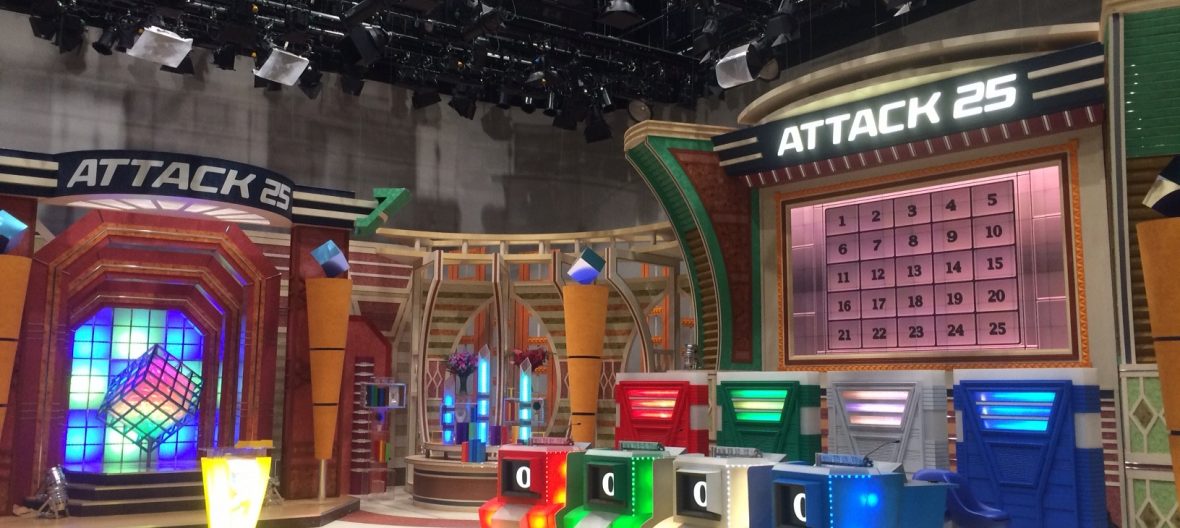
#tbt: Panel Quiz Attack 25
In this special audio feature, Christian Carrion explores one of the staples of the Japanese quiz show scene.
It’s been said that the urge for many performers to get on stage is brought about by a need for approval, a want for love – and, for a performer who wants love, there isn’t a much better gig than being a game show host. Game shows are such a unique facet of American broadcasting in that a host-show combo – a good one, anyway – has the potential to become a household name, appointment television, and leave an enduring, personal dent in the lives of viewers.
Our genre has no shortage of institutions. Alex Trebek and Jeopardy. Bob Barker and The Price Is Right. But on the other side of the planet, a quiz show has aired at 1:00 pm Monday through Friday for over four decades. Its first host was at the helm for longer than Barker or Trebek have been hosting Price or Jeopardy. It’s an undeniable icon of Japanese pop culture. Its name is Panel Quiz Attack 25. I’m Christian Carrion, and this is Throwback Thursday on Buzzerblog.
If you search on Google for “Japanese game show”, you’ll see lots of things that are quite different from what we know in America as a game show. You might see a lizard eating a pork chop off of a woman’s forehead. Comedians getting struck in the genitals for incorrectly reciting a tongue twister. The Japanese game show definitely has a reputation these days for being outlandish, gross, and generally bizarre. Panel Quiz Attack 25, often called Attack 25 for short, is not that type of show. It premiered in April of 1975, at a time when quiz and word games were as prevalent on Japanese TV as they were on American TV at that time, or on UK TV today. To put its existence into perspective: Attack 25 premiered while Password with Allen Ludden, Match Game with Gene Rayburn, and Jack Barry’s The Joker’s Wild were still in first-run episodes. Jeopardy – the original, with Art Fleming – had been canceled a mere three months prior. Family Feud didn’t even exist yet.
Two things in particular stand out about Attack 25. One, it’s the only game show on Japanese TV to feature civilian contestants. Two, it’s actually a pretty simple game. Four players, each representing a color – red, green, white and blue – face a five-by-five board of 25 numbered squares. A picture puzzle is shows, and the first player to buzz in with the correct answer claims box 13, the one in the middle, and turns it to their color. From here on out, most questions are straight trivia, with the occasional anagram or Who Am I?-type question. Any player who gives a correct answer claims a panel connected to one that’s already claimed.
The main conceit of the gameplay is the Attack, loosely based on the board game Othello, which became popular in Japan in the 70s and is still massively popular today. If a player surrounds an opposing player’s panels on either side, it’s an Attack; the surrounded panels are captured by the attacking player. The competition gets extremely tense as the players fight for territory on the board, turning the game from a fairly simple straight quiz to a delicious mix of knowledge, speed, and strategy.
If a player gets a question wrong, the player stands up from his or her chair and must miss the next two questions. Near the end of the game, a special Attack Chance question allows a player to return any box to its neutral state – a seemingly small change that can have cataclysmic effects on the result of the game. The player with the most territory once the board is filled gets some money for each box captured, and earns a chance to win a vacation by identifying a mystery subject from a video of various clues. The trick here is, the player can only see the video from behind the squares he or she captured; the video is projected onto the board, and only the winning squares are removed.
The original host of Attack 25 was Kiyoshi Kodama. Kodama was an actor who had made several appearances in movies and on TV before taking the job as host, starting with the pilot on April 6, 1975. He would continue in that role for the next 36 years. As host of Attack 25, he crested a popular catchphrase during the Attack Chance segment. To introduce that special question, he would raise his clenched fist, look straight into the camera and say, “Attack CHANCE!”
At the beginning of 2011, a noticeably thinner and more soft-spoken Kodama stepped down from his role on the show, citing health concerns. In May of that year, Kiyoshi Kodama succumbed to cancer at the age of 77. Since Kodama’s retirement, the role of host has switched several times. These days, the show is hosted by Shosuke Tanihara, perhaps best known to audiences outside Japan as Riki Fudoh in the 1996 film Fudoh: The New Generation.
From its start, Attack 25 has enjoyed great popularity. Home versions of the game were release for PS1, PlayStation and PlayStation 2, as well as several licensed quiz books. Among Japanese citizens, the show is known as somewhat of a guilty pleasure; the average viewer may even be embarrassed to admit how much he or she truly enjoys the show.
Panel Quiz Attack 25 serves as a sort of last bastion for a certain type of Japanese television. But at year 43, it’s clearly more than just a game show. An engaging format, a genial host, challenging material, pleasant visuals, and an unforgettable theme song – no matter what language you translate them to, these are the key elements of a TV game show institution.
